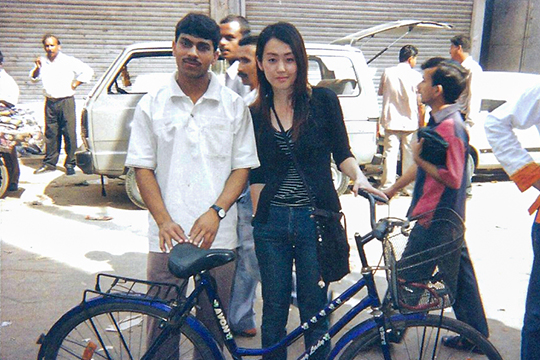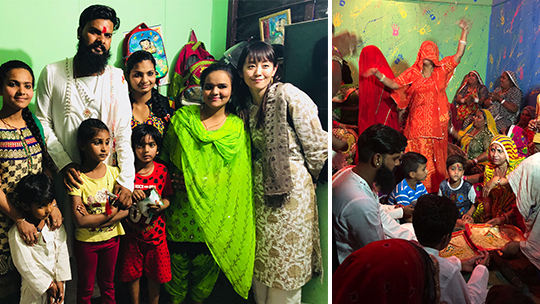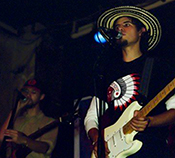Musical Education to Brighten the Future of Impoverished Children.
(Part 2)
Haruka Kosaka / Music journalist
Energizing Cultural Exchange Through Music.
Haruka Kosaka was assigned to write a feature article on India for a classical music journal. The assignment reignited her passion for the country and inspired her to launch a project to help underprivileged children from the slums. Drawing from her expertise and connections with performers in the world of classical music, she began to teach the children how to play musical instruments from the West. She continues to dedicate a great deal of time and resources to her project. She met with us to explain why.
Deploying resources from the world of classical music to support impoverished children.
My career as an editor drew me away from India for some time, but that was going to change. In 2009, the journal I worked for decided to run a feature article on the theme of classical music and India. I flew to India to conduct some interviews, at once reconnecting with the excitement I experienced in my earlier stay as a research student. A visit to the slum of performing artists brought back a flurry of memories, together with the passion I used to feel about the people in that community. Over the ensuing years back home in Japan, I kept wondering if there were something I could do as an experienced music journalist to support those people. The idea that finally came was to teach classical music to young street performers. The plan was a perfect fit, a true calling for me as a person passionate both about the world of classical music and Indian society.
Given that I had limited experience in starting a project like this, I immediately started contacting people through my connections from the world of classical music, in search of support. Hatching the project was a new experience for me, and to this day the project remains a work in progress. Much of the time I am asking professional artists for introductions to musical instrument specialists who are willing to give lessons for the project. Every part of the project has been developed from scratch and still has far to go. My full life experience comes to bear in every step forward I make. The effort I put into the project deepens my love for it.

Anticipating a wholly new sound from the slum community.
In February 2018 I organized a workshop as a pilot for my project, inviting children from the community of street performers to try their hand at the violin. These talented children quickly grasped the basics of the violin, an instrument they had never touched, and managed to play several tunes after some practice. My plan is to teach them a small repertoire of popular classical pieces, along with some tracks from Bollywood films. It is important for these people to learn something that directly generates income, and Bollywood music makes an ideal choice: everyone loves it, the music is easy to play, and the children enjoy practicing it. With help from the Bollywood music, I am hopeful that the project will endure.
I would love to see the children play classical ensemble pieces in the future. The project also has the potential to become a platform for the creation of a wholly new sound. When the unique characteristics of Indian traditional performing arts, such as the rhythms and improvisation, meet classical music, we never know what may happen. I cannot imagine the sounds to emerger, but as a music lover I have great expectations for the potential.
Curiosity is the most powerful drive of all.
People often ask me why India interests me so much. The answer is quite simple. It is because I am fascinated by India. It just happened this way. If my first trip abroad had been to Africa, I might have been fascinated by African people instead. In India I can enjoy myself while pursuing various activities. This is important in order to be myself. In India I am motivated, so difficulties are challenges rather than problems, which gives me the strength to contribute to local communities. India stimulates my curiosity, which drives my efforts to provide meaningful support.

I have a great hope for this project. I want it to become a lasting effort that inspires in many people the very things that inspire and intrigue me. It would be wonderful to have Japanese artists and students travel to India to make music with the children. A mutual respect develops when people communicate and share their cultures with each other in person. I hope one day my music education project will achieve this level of cultural exchange. Though just the start of my journey, I am hopeful about where it will lead in the future.
- Haruka Kosaka / Music journalist
- A freelance journalist specializing in classical music, Haruka Kosaka first took an interest in India while traveling the country as a student. Later she studied slum communities in India for her postgraduate degree, working and living with a community of street performers for over six months. In 2018 she launched a project to give children from those communities an education in classical music. In the same year she published Kin no Himawari - Memories of pianist Hiroko Nakamura (2018, Shueisha).
Interview Date:



